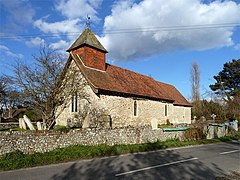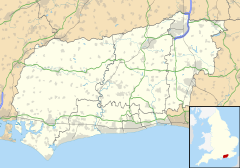Earnley
| Earnley | |
|---|---|
 Earnley parish church | |
Location within West Sussex | |
| Area | 7.10 km2 (2.74 sq mi) [1] |
| Population | 459. 2011 Census[2] |
| • Density | 63/km2 (160/sq mi) |
| OS grid reference | SZ815969 |
| • London | 60 miles (97 km) NNE |
| Civil parish |
|
| District | |
| Shire county | |
| Region | |
| Country | England |
| Sovereign state | United Kingdom |
| Post town | CHICHESTER |
| Postcode district | PO20 |
| Dialling code | 01243 |
| Police | Sussex |
| Fire | West Sussex |
| Ambulance | South East Coast |
| UK Parliament | |
| Website | http://earnleypc.org/ |
Earnley is a village and a civil and ecclesiastical parish in the Chichester District of West Sussex, England. It is located four miles (6.4 km) south-west of Chichester, and lies on the south coast of England. The parish includes the settlements of Almodington and Batchmere.
History
[edit]An Anglo-Saxon charter of AD 780[a] names a piece of land as 'Earnaleach and Tielesora' that was given to the church of St Paul.[b][3][4] Then in a charter, dated AD930, King Æthelstan granted to Bishop Beornheah of Selsey,[c] land at Medmerry in Selsey 'with the woodland and fields lying therewith called Erneleia'.[5]
Historically Earnley was situated in the hundred of La Manwode or Manwood, now known under the form Manhood. The name La Manwode means 'the common wood' and extended round Hundredsteddle[d] Farm, where the boundaries of the Witterings, Birdham, and Earnley coincide. Hundredsteddle[d] was the meeting place for the hundred moot and other hundred business. The name Hundredsteddle[d] refers to the floor on which the Hundred court would have sat.[7][8] It lay in the ancient pre-Conquest division of Sussex known as the Rape (county subdivision) of Chichester. The Domesday survey does not include Earnley, however it is possible that at that time it was included with East Wittering or West Wittering.[9] The mediæval lords of the manor here belonged to the Ernle, Ernley, or Erneley family, and derived their surname from a manor they held in this parish. The land was given to Luke de Ernele by his nephew, William de Lancing as part of a Knight's fee, in 1166.[4]
Earnley Church is a grade II* listed church[10] and together with its small graveyard is contained within retaining stone walls of an interesting boat shaped island of land. The nave is of 13th-century origin. A century later the chancel was added; an aumbry fitted with a carved door dates back to the 14th century. The first recorded rector was in office in 1365; parish registers survive from 1562, but there is no record of a dedication. It has always simply been "Earnley Church".[11]
Placename
[edit]
The O.E. form of Earnley was Earnlēah. 'Earn' meaning Eagle (or possibly a person's name) and 'lēah' wood, glade or clearing.[12] [13]
Culture and community
[edit]- In June every year since 2016 the Parish Council holds an annual fete.[14]
Landmarks
[edit]Part of the Site of Special Scientific Interest Bracklesham Bay runs along the coastline of the parish.[15]
Notes
[edit]- ^ The AD 780 charter (Charter WSRO Cap I/17/2) is the only Selsey charter to survive as an original.[3]
- ^ The location of St Paul has not been identified, but was possibly at Wittering or Selsey.[3]
- ^ The Sussex Diocese was based in Selsey from c.681-c.1075
- ^ a b c The word steddle was quite common in Sussex various examples being: Bedsteddle - Bedstead; Jointsteddle - a stool framed by joinery work; Oxsteddle - Stabling or stalls for oxen; Steddle - a small side table or a temporary arrangement of boards and trestles.[6]
References
[edit]- ^ "2001 Census: West Sussex – Population by Parish" (PDF). West Sussex County Council. Archived from the original (PDF) on 8 June 2011. Retrieved 26 April 2009.
- ^ UK Census (2011). "Local Area Report – Earnley Parish (E04009894)". Nomis. Office for National Statistics. Retrieved 18 July 2019.
- ^ a b c Kelly, S.E (1998). Anglo-Saxon Charters VI, Charters of Selsey. OUP for the British Academy. pp. 46–53. ISBN 0-19-726175-2.
- ^ a b 'Earnley', in A History of the County of Sussex: Volume 4, the Rape of Chichester, ed. L F Salzman (London, 1953), pp. 201-203. British History Online. accessed 19 March 2016
- ^ Kelly, S.E (1998). Anglo-Saxon Charters VI, Charters of Selsey. OUP for the British Academy. pp. 71–77. ISBN 0-19-726175-2.
- ^ Parish, William Douglas (1875). A Dictionary of the Sussex Dialect and Collection of Provincialisms in use in the County of Sussex. Lewes: Farncombe & Co.
- ^ Stenton, F.M; Mawer, A (1930). Placenames of Sussex. Cambridge: Cambridge University Press. p. 79.
- ^ Salzman, L.F, ed. (1953). ""The hundred of Manhood: Introduction." A History of the County of Sussex: the Rape of Chichester". Victoria County History. London: British History Online. Web. p. 198. Retrieved 18 July 2019.
- ^ "Open Domesday: Hundred of Wittering". Retrieved 29 June 2023.
- ^ Historic England. "The Parish church, Earnley (1026360)". National Heritage List for England. Retrieved 17 July 2019.
- ^ "Earnley Church". St Anne's Church East Wittering. Archived from the original on 17 July 2019. Retrieved 17 July 2019.
- ^ Roberts, R.G., ed. (1914). The placenames of Sussex. Cambridge University Press. p. 59.
- ^ Gelling, Margaret (1984). Place-Names in the Landscape. London: Orion Publishing. pp. 198–205. ISBN 1-84212-264-9.
- ^ "Earnley Fete 10th June 2017". Earnley Parish Council. 25 May 2017. Retrieved 8 June 2017.[permanent dead link]
- ^ "SSSI Citation — Bracklesham Bay" (PDF). Natural England. Retrieved 4 April 2009.
Sources: Victoria History of the County of Sussex, volumes 2 and 7
External links
[edit]![]() Media related to Earnley at Wikimedia Commons
Media related to Earnley at Wikimedia Commons

